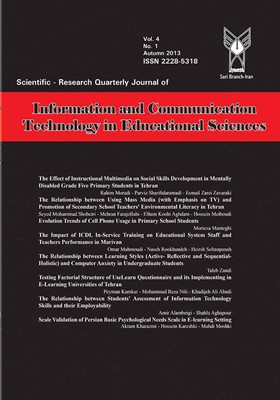بررسی روند تحولی چگونگی کاربری از تلفن همراه در دانشآموزان دبستانی
الموضوعات :
Infomartion Technology
مرتضی منطقی
1
1 - دانشیار دانشگاه خوارزمی
تاريخ الإرسال : 13 الأحد , رمضان, 1434
تاريخ التأكيد : 20 السبت , شوال, 1435
تاريخ الإصدار : 27 الجمعة , ذو الحجة, 1434
الکلمات المفتاحية:
جامعه,
پژوهش کیفی,
خانواده,
تلفن همراه,
دانش آموز,
کاربری تلفن همراه,
مدرسه,
ملخص المقالة :
هدف از پژوهش حاضر، بررسی روند تحولی چگونگی کاربری از تلفن همراه در کودکان دبستانی بود. روش پژوهش کیفی، از نوع داده بنیاد است. نمونه مورد مطالعه 115 دختر و پسر دبستانی کاربر تلفن همراه بود که در کلاسهای اول تا ششم دبستان مشغول تحصیل بودند. نمونه گیری پژوهش هدفمند بود. نتایج پژوهش حکایت از آن دارد که کاربران دختر و پسر تلفن همراه در سالهای اول دبستان، پس از آشنایی با کاربریهای تلفن همراه، برخی از کاربریهای مثبت از تلفن همراه (مانند: استفادههای ارتباطی، تفریحی، آموزشی، خدماتی) را دارند، اما در سالهای آخر دبستان به دلیل عدم بسترسازی فرهنگی لازم برای کاربری مناسب از تلفن همراه در جامعه، مدرسه و خانواده، رفته رفته کاربری آنان به سمت کاربری نامناسب (مانند اتلاف وقت، مزاحمتهای تلفنی، مردم آزاری، تفاخرجویی، تسهیل روابط دختر و پسر، عشق پیامکی، شارژ کشیدن، بلوتوث بازی، افشای اطلاعات شخصی افراد، کاربری از عکسها و فیلمهای نامناسب و هرزهنگار، پرخاشگری الکترونیکی، یافتن هویت پنهان، سردرگمی هویتی، اعتیاد به تلفن همراه) سوق پیدا میکند.
المصادر:
Bellina, L., & Missoni, E. (2009). Mobile cell-phones (M-phones) in telemicroscopy: Increasing connectivity of isolated laboratories. Diagnostic Pathology, 4:19. doi: 10.1186/1746-1596-4-9.
Consortium for School Networking. (2011). Acceptable use policies in a web 2.0 & mobile era: A guide for school districts. Consortium for School Networking.
Crin, W. C. (2000). Theories of development, concepts and applications (4th Edition). New Jersey: Prentice Hall.
Diamantes, T. (2010). Recent court rulings regarding student use of cell phones in today's schools. Education, 131(2), 404-406.
Frieser, M. (2009). Sector profile: Porn in the USA. Retrieved from www.mobile entertainment news
Gayeski, D. (2002). Learning unplugged: Using mobile technologies for organizational training and performance improvement. New York: American Management Association.
Hulme, M. (2001). Me, my phone and I: The role of the mobile phone. Retrieved from www.michaelhulme.co.uk
Johnson, C., & Kritsonis, W. A. (2007). National school debate: Banning cell phones in public schools: Analyzing a national school and community relations problem. National Forum of Educational Administration and Supervision Journals, 25(4).
Matlin, M. W. (1987). The psychology of women. Philadelphia: Holt, Rinehart and Winston, INC.
McGuigan, J. (2005). Toward a sociology of the mobile phone. An Interdisciplinary Journal on Humans in ICT Environments, 1(1), 45-57.
Morrison, C. T. (2009). What would you do, what if it's you? Strategies to deal with a bully. Journal of School Health, 79(4), 201-204.
Nicol, A., & Fleming, M. J. (2010). “i h8u”: The influence of normative beliefs and hostile response selection in predicting adolescents' mobile phone aggression-a pilot study. Journal of School Violence, 9(2), 212-231.
Plant, S. (2000). On the mobile, the effects of mobile telephones on social and individual life. Online PublicationsSociology ofthe Mobile Phone. Soziologisches Institut der Universität Zürich.
Raskauskas, J. (2010). Text-bullying: Associations with traditional bullying and depression among New Zealand adolescents. Journal of School Violence, 9(1), 74-97.
Roberts-Pittman, B., Slavens, J., & Balch, B. V. (2012). The basics of cyberbullying. School Administrator, 69(4), 33-37.
Santroc, J. W. (2005). Adolescence (10th Ed.). London: Mc Graw Hill.
Strauss, A., & Corbin, J. (1998). Basics of Qualitative Research Techniques and Procedures for Developing Grounded Theory (2nd edition). London: Sage.
Thomas, K. M., & McGee, C. D. (2012). The only thing we have to fear is... 120 Characters. TechTrends: Linking Research and Practice to Improve Learning, 56(1), 19-33.
Uhler, S. F., & Smith, G. T. (2012). Regulating conduct in new frontiers. Education Digest: Essential Readings Condensed for Quick Review, 77(8), 47-52.
Yilmaz, H. (2011). Cyberbullying in Turkish middle schools: An exploratory study. School Psychology International, 32(6), 645-654.


